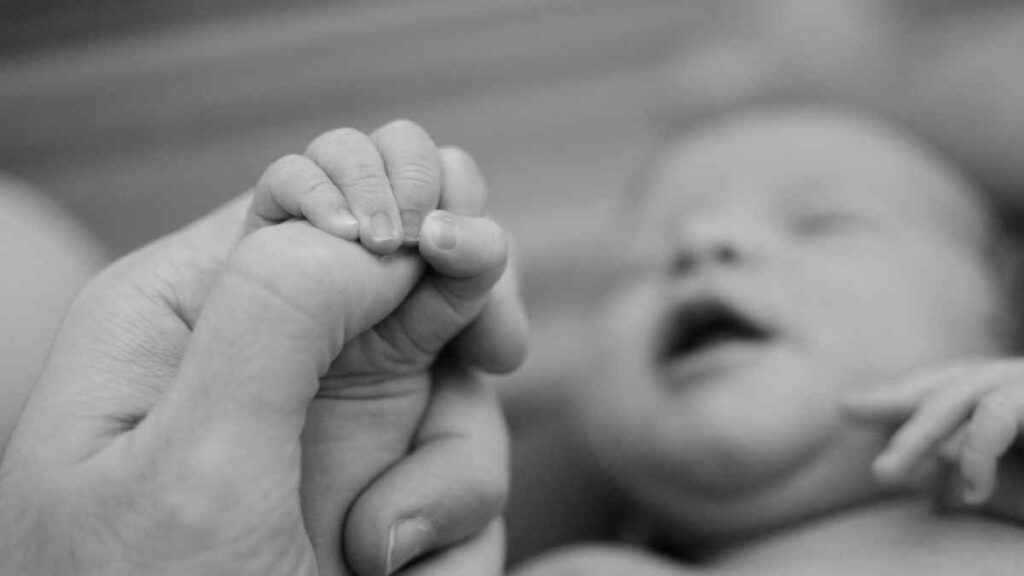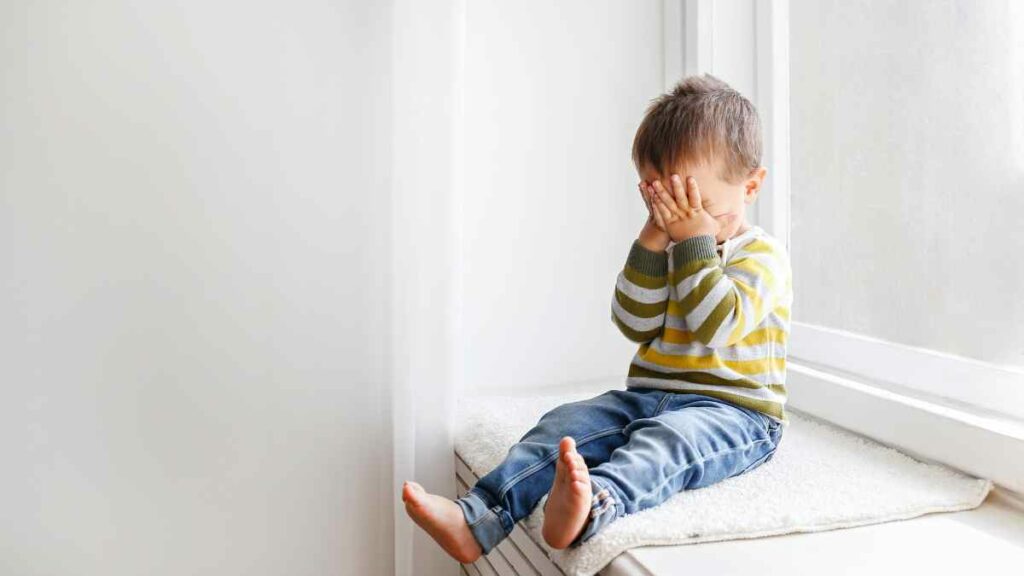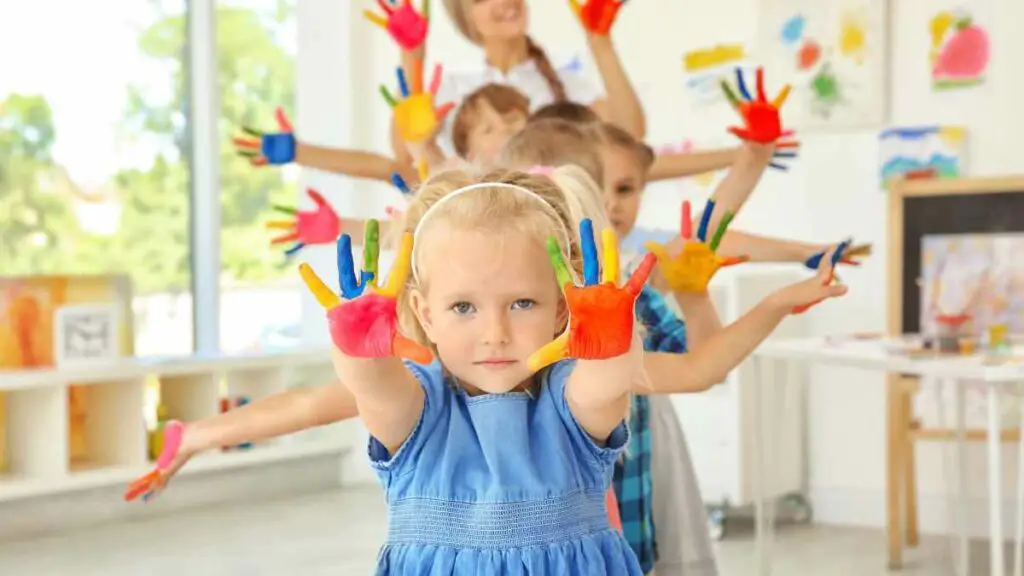‘When does parenting get less exhausting?’ Is it when your kids finally start sleeping through the night, and you can get some shut-eye yourself? Or when they start school, and you can have the house to yourself to enjoy some peace and quiet?
Well, it’s normal for exhausted and sleep-deprived new parents to ask this question. The hope that someday things will get easier and life will return to normal keeps them sane.
If you’re reading this, chances are you’ve just put the baby to sleep and can’t stop thinking about when parenting would get less exhausting. I could tell you it’d get easier when your kids become more independent, and it will.
But there is no clear timeline or definitive answer to when exactly it gets less exhausting. But, eventually, it does. In this article, I will explain the stages of parenthood and my pro tips to make the stages less exhausting.

How to Make Parenting Less Exhausting at Different Stages of Parenthood
There are 5 distinct stages of parenthood. No matter how much joy these stages bring, they all have unique challenges. The good news is there are ways to make them more rewarding and less challenging. Let’s get into it, shall we?
Stage 1: Infancy

Most parents find the newborn stage, especially the first few months, the most challenging, understandably so. New moms trying to heal from childbirth while feeding and caring for a newborn can be exhausting.
Even though you don’t have to run after them or deal with temper tantrums during these early days, sleep deprivation and adjusting to the new routine make it exhausting.
Pro tip: To make this stage less exhausting, you can:
-

Bold Male Pride – Baseball Trucker Cap Celebrating Masculinity
£18.00 Select options This product has multiple variants. The options may be chosen on the product page -

Dad Bod Appreciation Gift Mug
£14.00 Add to cart -

Dad Bod, Bad Jokes Structured Baseball Cap
£22.00 Select options This product has multiple variants. The options may be chosen on the product page
- Try to get as much sleep as you can. I’m sure you’ve heard this before, ‘Sleep when the baby sleeps.’ At least try to get some rest if you can’t sleep or have to deal with your other kids or get some housework done.
- Share the nights with your partner whenever possible.
- Let your friends and family help you without feeling guilty about not doing everything alone!
Stage 2: Toddlerhood

Just when you thought you got the hang of this parenting thing, your toddler starts throwing up new challenges. During the toddler years, your child becomes more mobile, likes to explore new things, and loves to assert independence as their personality develops.
They go through sleep regression and start waking up multiple times at night, making it hard for you to sleep. Not to forget toddler stage is when it’s normal for children to throw tantrums, test their limits, put everything in their mouth, run around the house, and get hurt (a lot).
Between running after them during the day and winning the bedtime battles at night, you become so exhausted to even talk to your partner, let alone spend some alone time together. No wonder lots of couples drift apart after a baby.
Pro tip: To make this stage a little less exhausting and connect with your partner, you can:
- Establish a daily routine for your toddler so they know what to expect and what’s expected of them to avoid power struggles.
- Give them choices whenever you can. It’s important for your child’s development and will help them become independent adults.
- Find someone to watch the kids while you spend some quality time with your partner.
Stage 3: Early Childhood( Preschooler age)

At this stage, your young child understands the world and can communicate well enough to express their feelings. They become more independent and can do a few things without your help.
They start to pursue new interests that might not last too long. No matter how supportive you want to be of their newfound passion, it gets frustrating when they lose their interest in things in a few days.
So, what can you do to make things bearable at this stage?
Pro tip:
- Keep maintaining a consistent daily routine.
- Set rules and explain the consequences of not following them. Don’t forget to follow through with consequences.
- Try to find the fun in things they’re interested in and spend quality time doing those with them.
Stage 4: School-age

Kids are 6-12 years old at the school-age stage. They’re now more independent and can do a lot of things on their own. While it takes some responsibilities off your plate, it adds the emotional stress of letting them deal with the world independently.
This is when child rearing gets more demanding as children assert autonomy and challenge the rules you set. They might start arguing and refuse to do what you asked them to.
Pro tip:
- Be patient with them and use positive disciple techniques to teach them right from wrong.
- Try to work together to avoid power struggles.
- Spend quality time with them and give enough positive attention to reduce attention-seeking behaviors.
Stage 5: Adolescence

Most parents find the preteen years and teenage years really difficult. Your kids are no longer babies but aren’t adults yet. Their hormones make them moody, and they’re dealing with physical changes while figuring out their self-identity.
They don’t want to spend as much time with you anymore. One moment they’re all sweet, and the next, they want you to leave them alone. It can be confusing and overwhelming even for the calmest of parents.
Pro tip: To make the teenage stage less exhausting, you can:
- Make sure to look after yourself and enjoy some me time now that your child doesn’t need you all the time.
- Try to be their friend so they feel comfortable sharing things with you.
- Guide them through this new stage of life but be open to letting them do things their way.
What is the hardest baby stage?
Well, there’s no straightforward answer to this question as it depends on each parent and their kids. Sleep deprivation hits a night owl differently than it hits a morning lark. Caring for a colicky baby who cries a lot can be more difficult than dealing with other newborns.
For most parents, the newborn stage is the hardest. The physical exhaustion of labor and childbirth, sleepless nights, and trying to create a newborn routine that works for the baby can be pretty tiring.
But, at least most babies sleep and stay in one place most of the time. Dealing with toddlers, on the other hand, is a whole new ball game. They keep testing your limits, throw tantrums if you don’t give in, and go through sleep regressions to make parenting even more challenging.
At this stage, your child knows what they want and how they want it. They now have personal preferences and strong opinions and are, therefore, ready to fight back if you want them to follow your instructions.
While dealing with school-age kids and teenagers is physically less demanding, worrying about how they will cope with the outside world without your help doesn’t make it any easier.
Does parenting get easier as they get older?

Well, that actually depends on your personality and parenting style. Different stages of parenting come with their own set of challenges as well as rewards. Since no two kids are alike, it gets easier at different times for different parents.
In every baby stage, some challenges are different than the last one. While parenting never feels like a walk in the park, some things get comparatively easier as the children grow older.
While your primary concern at the newborn stage is to keep them alive, it changes when they turn into angry teenagers. Now you have to worry about keeping them away from drugs, teen pregnancy, violence, and whatnot!
So even when the baby years are over, and you won’t have to stay awake to feed them or change diapers, worrying about older kids making the right decisions might keep you up at night.
How do I get out of parenting burnout?
There are a few things you can do to combat parental burnout and make parenting less exhausting. Here are some tips for you.
Don’t Bottle It Up
Don’t isolate yourself or feel ashamed because you’re struggling. Join parents’ forums on social media, and talk to your friendly neighbor, friends, and family. Ask questions, connect with other parents, and talk about your feelings.
By opening up, you’ll realize that you are not alone and so many parents are going through the same journey. This will take some pressure off of you and make it less exhausting.
Ask For Help
You might feel like you must do it alone and hesitate to ask for help. But there are many reasons why they say, “It takes a village to raise a child.” Make sure you ask for help if and when you need it.
If it gets too hard and you struggle with depression and anxiety, seek professional help.
Practice Self-care
When someone watches the kids or they’re sleeping, take some time to practice self-care. Self-care doesn’t just always mean taking bubble baths and indulging in chocolate treats. Sure, those things can be part of your self-care routine.
But at its core, self-care means prioritizing and caring for your physical, mental, and emotional well-being. It can look different for everyone. Feeling a little lost? Here are 25 self-care ideas for you to explore.
Conclusion
From the physically exhausting sleepless nights to the significantly easier days of emotional labor, parenting stays the full-time job that it is. But the joy of reaching new milestones and growing together makes it all worth it.
The trick is to start enjoying the ride, stop stressing and find the parenting style that works for you. The moment you start doing it, that’s exactly when it starts to get less exhausting and more fun. Hope you reach there sooner than later.







